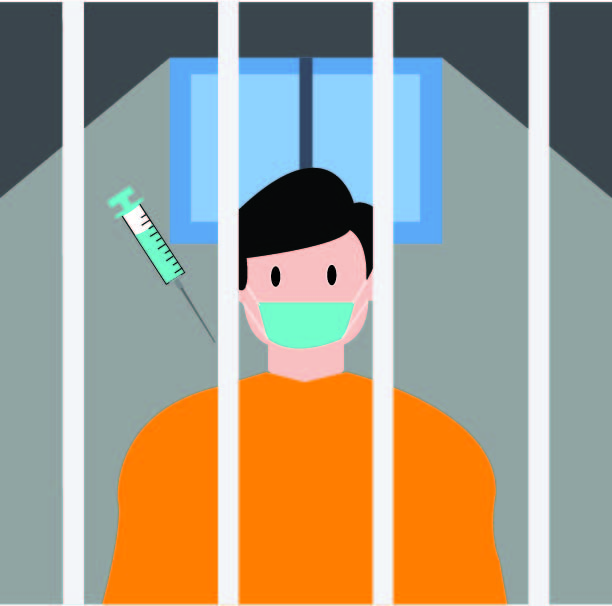Pandemic Prisons
October 7, 2021
When we think of prisons, we often think of overcrowded conditions, mushy food, and dehumanizing guards. Now imagine these conditions with a global pandemic. United States citizens who have been incarcerated have been treated horribly over the past 18 months.
There has been zero concern for COVID-19 among guards and staff members in many prisons. Guards have been reported to ‘cough’ at prisoners who are concerned about COVID-19 and mock them for trying to take personal precautions. Prisoners are often “quarantined” by being put in solitary confinement for two weeks. According to NPR, “Inmates often dread isolation. But Dennis, who had been following the news, embraced it.” NPR interviewed the spouses of incarcerated people at Indiana’s playfield correction facility, and the wife of Dennis stated, “Yes, they committed a crime, and they were sentenced,” Lisa says, “but they weren’t sentenced to death.” Dennis was diagnosed with Chronic Obstructive Pulmonary Disease, (COPD), and this could cause major complications if Dennis contracts COVID-19. Prisoners who have COVID-19 symptoms are frequently left in the dorms with many others.
Many prisoners at Indiana’s playfield correction facility have reported that the staff is not taking the proper precautions to keep them safe. These people are concerned for the safety of their lives. Junior Linda Bennington reported that she would feel “anxious and really scared.” In such a situation. Many incarcerated people with health risks have no means of personal protection. Prisoners are not kept socially distanced, and staff often decide not to quarantine those who test positive.
According to NPR, the majority of the U.S.’s largest breakouts have happened within prisons. Freshman Bleu Carroz, sophomore Zoë Mockford, senior Melody Doustkam, and junior Linda Bennington said this was the first they had heard of these breakouts. Senior Melody Doustkam states “People tend to think less of prisoners. There would be more coverage if the outbreaks were in other places.”. Freshman Bleu Carroz assumes there is not much coverage on this subject because, “Broadcasts want viewers, the viewers want to care, and so on. No one seems to care about incarcerated people and their safety, so they don’t talk about them.”
Viewers express deep concern towards outbreaks in nursing homes and those stories blew up and were widely shared, so why are these outbreaks not being treated the same way? People want to care about those who seem like saints to the public. Incarcerated people are surrounded by so many biases and stereotypes that no one wants to openly discuss the way they are being treated and why it is so wrong. They may have committed crimes, or made mistakes in the past, but that does not mean they should not be treated like human beings.
There have been upwards of 400,000 COVID-19 cases in prisons across the U.S. over the course of the pandemic. When presented with this fact, sophomore Zoë Mockford says, “We don’t need that many prisoners. Everyone’s kind of fending for their lives. They can’t escape, they can’t move.” Many of these prisoners could have been put in separate facilities for non-violent offenses, yet many of them were still kept in the higher security prisons. Keeping these prisoners in lower-security facilities would allow for them to not only have more freedom, but they would be able to stay safer and have more personal protection.
According to The University of Chicago, those incarcerated in the U.S. are around “five times as likely to test positive for the coronavirus as Americans generally and nearly three times as likely to die” This is also severely affecting incarcerated people’s families, they are very concerned for their loved ones’ health, and there is nothing they can do about it.
Last spring, many state governors reported the prison conditions to be much better than the reality. According to NPR, Gov. Eric Holcomb claimed that the prisoners in the facility he managed were “maybe even safer than just letting them out.” The wife of a prisoner, Lisa, laughed when she heard Holcomb’s claim. “Wow. That’s a big lie,” she says. “They have them herded like cattle, all crammed together, where the virus can just jump from one to the other. There’s no protection.”, she continues. This would feel so frustrating, knowing that state officials are lying about the safety of your loved ones and being afraid for their safety. Carroz says, “The truth should always be disclosed, even if some may not like it. False information can only lead to more unsafe/unethical actions.”
If more people knew the true situations and conditions in our prisons, officials would be held more accountable. It should not only be prisoner’s loved ones who are aware of this situation. Lots of news stations are arguing that their content should be light and positive right now, but this subject really needs to be discussed and brought to light.




